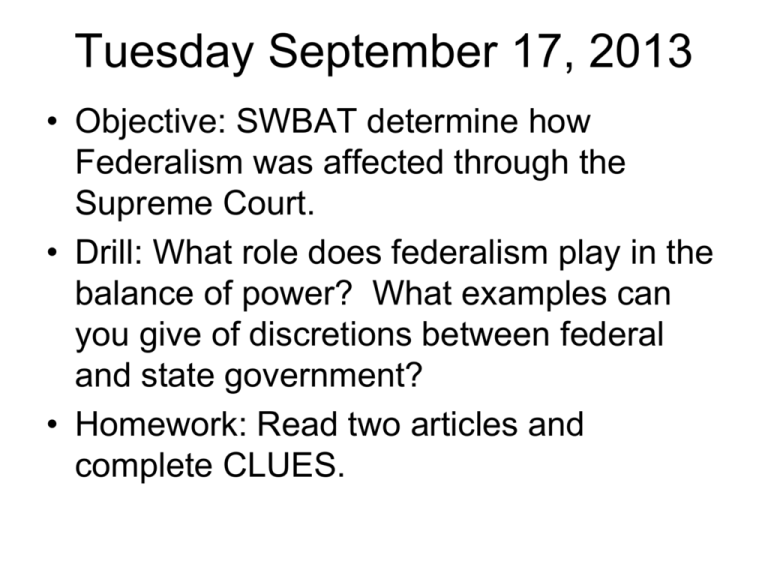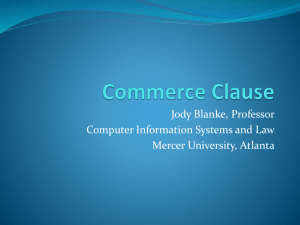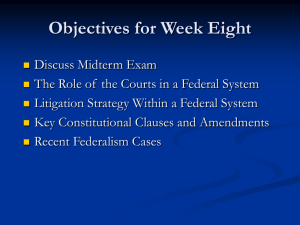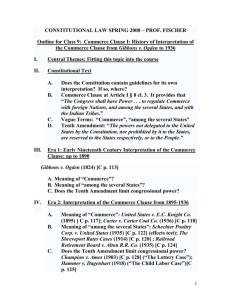Federalism and Supreme Court Cases
advertisement

Tuesday September 17, 2013 • Objective: SWBAT determine how Federalism was affected through the Supreme Court. • Drill: What role does federalism play in the balance of power? What examples can you give of discretions between federal and state government? • Homework: Read two articles and complete CLUES. Federalism and the Balance of Powers • In pairs look over the Supreme Court Cases. • For each case: title of the case and year it was decided. – List the relevant parts of the Constitution – Decide how you and your partner would decide on this case. – What was the actual decision, what was the precedent that was set? 1. Necessary and Proper Clause- “Congress shall have the power …to make all laws which shall be necessary and proper for carrying into execution…all other powers vested by this Constitution in the government of the United States.” 2. 14th Amendment- “No state shall make or enforce any law which shall abridge the privileges or immunities of citizens of the United States; nor shall any state deprive any person of life, liberty, or property, without due process of law; nor deny to any person within its jurisdiction the equal protection of the laws.“ 3. Interstate Commerce Clause- “Congress shall have power…to regulate commerce…among the several states.” 4. Spending Clause- “Congress shall have power…to lay and collect taxes, duties, imposts and excises, to pay the debts and provide for the…general welfare of the United States.” 5. The 10th Amendment- “The powers not delegated to the United States by the Constitution, nor prohibited to it by the states, are reserved to the states respectively…” 6. The Supremacy Clause-“ The Constitution and the laws of the United States…shall be the supreme laws of the land…” Wednesday September 18, 2013 • Objective: SWBAT determine how Federalism affects the USA in regards to current issues. • Drill: What does this cartoon say about the separation of Powers? • Homework: Wilson 63-72 Cornell Notes Finish Supreme Court and Federalism Cases • Use the posters around the room to finish your worksheet, you have 15 minutes. The Elastic Clause/Necessary & Proper Clause-“Congress has the power…to make all laws which shall be necessary and proper…” Commerce Clause“Congress has the power to regulate commerce…among the several states…” Commerce=trade, buying/selling. Supremacy Clause-“The laws of the United States which shall be made…shall be the supreme law of the land…and every state shall be bound [by them]…” 14th Amendment/Equal Protection’s Clause-No one can be denied “equal protection of the laws” or “deprived of life, liberty or property without due process…” [organized legal process with rules]. Commander in Chief Clause-The president shall be Commander in Chief of the Army and Navy of the United States, and of the militia of the several states… 13th Amendment“Involuntary servitude… [slavery] shall not exist within the United States…” Judicial Review • Judicial Review is the power of judges in a court to decide or rule that a law is unconstitutional. • A law passed by a legislature may be considered unfair or discriminatory by someone. • Citizens affected by these unfair laws [ex. arrest and convictions in court] may decide to sue a government, person or organization or appeal their cases to a higher court. • A court may overturn, reverse or strike down any law if it believes it violates any portion of the U.S. Constitution. McCulloch v. Maryland (1819) Maryland enacted a statute imposing a tax on all banks operating in Maryland not chartered by the state. The statute provided that all such banks were prohibited from issuing bank notes except upon stamped paper issued by the state. The Second Bank of the United States was established pursuant to an 1816 act of Congress. McCulloch, the cashier of the Baltimore branch of the Bank of the United States, issued bank notes without complying with the Maryland law. Maryland sued McCulloch for failing to pay the taxes due under the Maryland statute and McCulloch contested the constitutionality of that act. The state court found for Maryland and McCulloch appealed. Questions: Does Congress have the power under the Constitution to incorporate a bank, even though that power is not specifically enumerated within the Constitution, and does the State of Maryland have the power to tax an institution created by Congress pursuant to its powers under the Constitution? Gibbons v. Ogden (1824) A New York state law gave two individuals the exclusive right to operate steamboats on waters within state jurisdiction. Laws like this one were duplicated elsewhere which led to friction as some states would require foreign (out-of-state) boats to pay substantial fees for navigation privileges. In this case a steamboat owner who did business between New York and New Jersey challenged the monopoly that New York had granted, which forced him to obtain a special operating permit from the state to navigate on its waters. Question: Did the State of New York exercise authority in a realm reserved exclusively to Congress, namely, the regulation of interstate commerce? Plessy v. Ferguson (1896) In 1890, Louisiana passed a statute called the Separate Car Act. This law declared that all rail companies carrying passengers in Louisiana had to provide separate but equal accommodations for white and non-white passengers. The penalty for sitting in the wrong compartment was a fine of $25 or 20 days in jail. Homer Plessy, a citizen of the United States who was one-eighth black and a resident of the state of Louisiana. On June 7, 1892, Plessy purchased a first-class passage from New Orleans to Covington, Louisiana and sat in the railroad car for "White" passengers. The railroad officials knew Plessy was coming and arrested him for violating the Separate Car Act. Plessy argued in court that the Separate Car Act violated the Thirteenth and Fourteenth Amendments to the Constitution. The Thirteenth Amendment banned slavery and the Fourteenth Amendment requires that the government treat people equally. Plessy appealed the case to the Louisiana State Supreme Court, which affirmed the decision that the Louisiana law was constitutional. Question: Is Louisiana's law mandating racial segregation on its trains an unconstitutional infringement on both the privileges and immunities and the equal protection clauses of the Fourteenth Amendment? Lochner v. New York (1905) The Bakeshop Act was a New York state labor law which prohibited bakery employees from working for more than sixty hours per week or ten hours per day. Lochner permitted an employee to work in his bakery for more than sixty hours in one week and was convicted of his second offense and fined. The state of New York argued that it was in the interests of the state to preserve the health of its population to ensure that it is robust and strong, while the federal government argued that the act prohibited the right to enter and make voluntary contracts, which is a liberty under the 14th Amendment. Question: Under constitutional law, does the New York law violate the liberty protected by due process of the Fourteenth Amendment by prohibiting the right of employers/employees from voluntarily entering into contracts? Hammer v Dagenhart (1918) The Keating-Owen Act of 1916, otherwise known as the Child Labor Act, prohibited the transportation in interstate commerce of goods produced at factories that violated certain restrictions on child labor. Roland Dagenhart worked in a cotton mill in Charlotte, North Carolina with his two minor sons, both of whom would be barred from employment at the mill under the Act. Dagenhart brought this lawsuit seeking an injunction against enforcement of the Act on the grounds that it was not a regulation of interstate or foreign commerce. The government asserted that the Act fell within the authority of Congress under the Commerce Clause. Question: Does the congressional act violate the Commerce Clause or the Tenth Amendment? A.L.A. Schechter Poultry Corporation v. US (1934) A.L.A. Schechter Poultry Corporation was convicted for violating the Live Poultry Code, found in Section: 3 of the National Industrial Recovery Act. Petitioners sold chickens wholesale in Brooklyn Slaughterhouses, primarily to butchers and retail dealers. Most of the chickens were purchased in NYC markets and railroad stations from commission men (to whom the chickens were consigned), and occasionally from commission men in Philadelphia. The US government argued that Schechter sold chickens in quantities outside of those permitted by the Live Poultry Code and thus violated a law established to regulate Interstate Commerce. Question: Does Federal Law cover transactions that deal with goods coming from a transaction in interstate commerce, but where all subsequent transactions are purely intrastate? Heart of Atlanta Motel v. US (1964) Title II of the Civil Rights Act of 1964 forbade racial discrimination by places of public accommodation if their operations affected commerce. The Heart of Atlanta Motel in Atlanta, Georgia, refused to accept Black Americans and was charged with violating Title II. Heart of Atlanta Motel had 216 rooms available to transient guests and had historically rented rooms only to white guests. Appellant solicits business from outside the State of Georgia through advertising in national travel magazines and other media. Approximately 70% of its guests are from outside the state. Appellant contends that Congress has overreached its authority under the Commerce Clause in enacting the Act Question: Did Congress, in passing Title II of the 1964 Civil Rights Act, exceed its Commerce Clause powers by depriving motels, such as the Heart of Atlanta, of the right to choose their own customers? Printz v. US (1997) The Brady Handgun Violence Prevention Act (Brady Bill) required "local chief law enforcement officers" (CLEOs) to perform background-checks on prospective handgun purchasers, until such time as the Attorney General establishes a federal system for this purpose. County sheriffs Jay Printz and Richard Mack, separately challenged the constitutionality of this interim provision of the Brady Bill on behalf of CLEOs in Montana and Arizona respectively. In both cases District Courts found the background-checks unconstitutional. Question: Using the Necessary and Proper Clause of Article I as justification, can Congress temporarily require states to regulate handgun purchases by performing those duties called for by the Brady Bill's handgun applicant background-checks? US v. Lopez (1995) Alfonzo Lopez, a 12th grade high school student, carried a concealed weapon into his San Antonio, Texas high school. He was charged under Texas law with firearm possession on school premises. The next day, the state charges were dismissed after federal agents charged Lopez with violating a federal criminal statute, the Gun-Free School Zones Act of 1990. The act forbids "any individual knowingly to possess a firearm at a place that [he] knows...is a school zone." Lopez was found guilty following a bench trial and sentenced to six months' imprisonment and two years' supervised release. Question: IS the 1990 Gun-Free School Zones Act, forbidding individuals from knowingly carrying a gun in a school zone, unconstitutional because it exceeds the power of Congress to legislate under the Commerce Clause? US v. Morrison/Brzonkala v. Morrison (2000) In 1994, while enrolled at Virginia Polytechnic Institute (Virginia Tech), Christy Brzonkala alleged that Antonio Morrison and James Crawford, both students and varsity football players at Virginia Tech, raped her. In 1995, Brzonkala filed a complaint against Morrison and Crawford under Virginia Tech's Sexual Assault Policy. After a hearing, Morrison was found guilty of sexual assault and sentenced to immediate suspension for two semesters. Crawford was not punished. A second hearing again found Morrison guilty. After an appeal through the university's administrative system, Morrison's punishment was set aside, as it was found to be "excessive." Ultimately, Brzonkala dropped out of the university. Brzonkala then sued Morrison, Crawford, and Virginia Tech in Federal District Court, alleging that Morrison's and Crawford's attack violated 42 USC section 13981, part of the Violence Against Women Act of 1994 (VAWA), which provides a federal civil remedy for the victims of gender-motivated violence. The District Court found that that Congress lacked authority to enact section 13981 under either the Commerce Clause or the Fourteenth Amendment, which Congress had explicitly identified as the sources of federal authority for it. Question: Does Congress have the authority to enact the Violence Against Women Act of 1994 under the Commerce Clause? Gonzalez v. Oregon (2006) In 1994 Oregon enacted the Death with Dignity Act, the first state law authorizing physicians to prescribe lethal doses of controlled substances to terminally ill patients. Attorney General John Ashcroft declared in 2001 that physicianassisted suicide violated the Controlled Substances Act of 1970 (CSA). Ashcroft threatened to revoke the medical licenses of physicians who took part in the practice. Oregon sued Ashcroft in federal district court arguing that the 10 th Amendment protected the states’ right to legislate end of life issues. Question: Did the Necessary and Proper Clause enable the federal government to overturn Oregon’s law or does the 10 th Amendment protect Oregon decision? Raich v. Gonzalez (2005) In 1996 California voters passed the Compassionate Use Act, legalizing marijuana for medical use. California's law conflicted with the federal Controlled Substances Act (CSA), which banned possession of marijuana. After the Drug Enforcement Administration (DEA) seized doctor-prescribed marijuana from a patient's home, a group of medical marijuana users sued the DEA and U.S. Attorney General John Ashcroft in federal district court. The medical marijuana users argued the Controlled Substances Act - which Congress passed using its constitutional power to regulate interstate commerce - exceeded Congress' commerce clause power. Question: Does the Controlled Substances Act exceed Congress' power under the commerce clause as applied to the intrastate cultivation and possession of marijuana for medical use? The Supreme Court’s decision in McCulloch v. Maryland concerned which of the following issues? I. The right of the federal government to control interstate commerce II. The Authority of a state to tax an agency of the federal government III. The right of the states to declare a federal law null and void IV. The right of the federal government to create the Bank of the United States under the necessary and proper clause a. I and II only b. II only c. II and IV only d. I and III only e. IV only Just jot down the letter of the correct answer Regulation of non-economic activity under the Commerce Clause is possible only through the Necessary and Proper Clause. The Necessary and Proper Clause confers supplemental authority only when the means adopted to accomplish an enumerated power are 'appropriate', are 'plainly adapted to that end', and are 'consistent with the letter and spirit of the constitution.' Requiring citizen-to-citizen subsidy or redistribution is contrary to the foundational assumptions of the constitutional compact. Gibbons v. Ogden (1824) • New York Legislature had passed a law giving a monopoly on steamship travel in New York state to a group of investors. • Among the people who had permission to do business under this monopoly was Aaron Ogden. • Thomas Gibbons, another steamship trader, wanted to use the New York waterways for his business, as well. • He had been given federal permission to do so. He was denied access to these waterways by the State of New York, which cited its law as enforcement. • Gibbons sued Ogden, and the Supreme Court agreed to decide the case. • The majority opinion, written by Marshall, said that the U.S. Constitution had a commerce clause that allowed the federal government to regulate commerce, in this case trade, wherever it might be, including within the borders of a state. • Previously, it was thought that the federal government had power over only interstate commerce. • But Marshall's opinion said that the commerce clause applied here, too. • Thus, the Supreme Court extended the definition of interstate commerce and cemented the power of the federal government over the states when laws conflicted. Plessy v. Ferguson! By: Hannah Corton PLESSY FERGUSON -He was denied the 13th and 14th amendment -“Race” was not properly defined -Separation was not equal -Plessy was classified as black -Louisiana has the right to regulate there railways -The 14th amendment was only made to give blacks and white equal protection under the law + = Printz V. United States No. 95-1478. Argued December 3, 1996 -Decided June 27, 1997 James Brady Reagan's White House Press Secretary Issue: The federal law had placed an undue burden on local law enforcement officials -Jay Printz Richard Mack- The Decision Five votes for Printz, Four votes against. The Supreme Court made their decision on the principle that the state legislatures are not subject to federal direction. The Court explained that while Congress may require the federal government to regulate commerce directly, in this case by performing background-checks on applicants for handgun ownership, the Necessary and Proper Clause does not empower it to compel state CLEOs to fulfill its federal tasks for it. Lopez v. United States 1995 Public Policy and The News • Continuum Exercise: – There will be a series of Policy Statements from the readings. – After each term is read based on your opinion move toward the area that corresponds to your feelings. Agree, Disagree, Undecided. Ground Rules • State your opinions when asked and the reasons for it. • Only one person speaks at a time. • Listen to other people’s opinions and reasons. • Do NOT try to respond by arguing. • If you have changed your mind, you may move to a spot that more accurately reflects your viewpoint. Be ready to explain your reason for moving. Policy Statements • Marijuana legalization has no chance becoming legal on the Federal Level. • I believe that states should have the right to decide if they want to legalize marijuana. • Federalism should be protected by the court system at all costs. • The initiatives having age and quantity requirements makes me more likely to agree. • It is the governments job to keep us safe, even from ourselves. • If the majority of people agree that marijuana should be legal, than it should be. (principles of Democracy) • Health Care: • The Supremacy Clause would not allow state governments to outlaw Obama care. • If these initiatives are passed states will have more power than the Federal government. • states have the right to declare their sovereignty from the Federal Government • Federalism will be restored. Marriage Equality, Religious Freedom • Our government is based on JudaeoChristian beliefs • Religion should not be part of our government. • The Government should force places of worship to accept same sex marriages. • The government should deny exemptions to churches who refuse same sex couples • The government should not even be involved in this discussion • States should individually decide the issue of same sex marriage • Judges should not have the right to overturn past judgments • Changes to the Constitution should only be made by ratification by states. • The Judicial Branch has far too much power. The power of the federal government was expanded by the following Supreme Court decisions: I. II. III. IV. McCulloch v. Maryland Marbury v. Madison Barron v. Baltimore Gibbons v. Ogden a. I and II only b. I, II, and III only I, II, IV only c. III and IV only d. I and IV only Wrap Up 1. States may not tax a federal bank because of the Supremacy Clause and the federal government may create a national bank under the necessary and proper clause. 2. States may not regulate the movement of goods between two states because the transportation is a federal right under the interstate commerce clause. 3. States may implement separate-but-equal laws because they do not violate the 14th Amednment’s “equal protection” clause because there are facilities for both races. 4. Congress may not regulate child labor within a state because the children are involved in the manufacturing of a product and manufacturing is not interstate commerce. 5. Congress may not regulate a transaction that is the result of interstate commerce. 6. The Court distinguished between direct effects on interstate commerce, which Congress could lawfully regulate, and indirect, which were purely matters of state law. 9/17/2013 a. Lochner v. New York c. McCullough v. Maryland c. Hammer v Dagenhart d. Plessy v. Ferguson e. Gibbons v. Ogden f. A.L.A. Schechter Poultry Corporation v. US Wrap Up 9/17/13 1. Which of the following cases INCREASED Federal Power? Gibbons v. Ogden Brown v. Board of Ed. U.S. v. Morrison Raich v. Gonzalez McCulloch v. Maryland U.S. v. Lopez Printz v. United States Plessy v. Ferguson Heart of Atlanta Hammer v Dagenhart 2. Which of the following cases altered our interpretation of the Commerce Clause? Gibbons v. Ogden McCulloch v. Maryland Brown v. Board of Ed. U.S. v. Lopez U.S. v. Morrison Printz v. United States Raich v. Gonzalez Plessy v. Ferguson Heart of Atlanta Hammer v Dagenhart 3. What are three overall conclusions that we can make about the relationship between the Supreme Court and Federalism?






